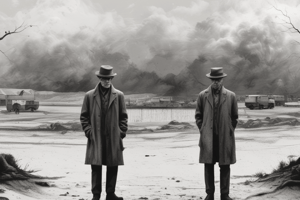Podcast
Questions and Answers
Why are the characters in 'Waiting for Godot' considered examples of human absurdity?
Why are the characters in 'Waiting for Godot' considered examples of human absurdity?
- They communicate clearly and effectively with each other.
- They always patiently wait for Godot without any doubt.
- They are often caught in a cycle of irrational actions and decisions. (correct)
- They engage in meaningful and purposeful activities.
What aspect of human nature is highlighted through the characters repeating the same actions in 'Waiting for Godot'?
What aspect of human nature is highlighted through the characters repeating the same actions in 'Waiting for Godot'?
- The practice of compromising to achieve goals.
- The ability to generate innovative solutions for dilemmas.
- The swift adaptation to changing circumstances.
- The tendency to get stuck in patterns of behavior that lead nowhere. (correct)
In 'Waiting for Godot,' what does the absurdity of language exemplify?
In 'Waiting for Godot,' what does the absurdity of language exemplify?
- Use of language to convey clear messages.
- Logical and straightforward expressions.
- Incomprehensible metaphors that lack contextual meaning. (correct)
- Precise and accurate communication.
What overarching theme does 'Waiting for Godot' explore through its depiction of absurdity?
What overarching theme does 'Waiting for Godot' explore through its depiction of absurdity?
Why does the repetition of actions in 'Waiting for Godot' serve as an illustration of absurdity?
Why does the repetition of actions in 'Waiting for Godot' serve as an illustration of absurdity?
What is a central theme in 'Waiting for Godot'?
What is a central theme in 'Waiting for Godot'?
How do Estragon and Vladimir feel as they wait in 'Waiting for Godot'?
How do Estragon and Vladimir feel as they wait in 'Waiting for Godot'?
Who are the two main characters in 'Waiting for Godot'?
Who are the two main characters in 'Waiting for Godot'?
What adds to the sense of absurdity regarding the waiting in the play?
What adds to the sense of absurdity regarding the waiting in the play?
How is communication depicted in 'Waiting for Godot'?
How is communication depicted in 'Waiting for Godot'?
What does the phrase 'It's a long time since I went to the can' exemplify in 'Waiting for Godot'?
What does the phrase 'It's a long time since I went to the can' exemplify in 'Waiting for Godot'?
Study Notes
Absurdity in "Waiting for Godot"
"Waiting for Godot" is a play written by Samuel Beckett, first performed in 1953. The absurdist, existentialist, and bleak portrayal of human existence has captivated audiences worldwide due to its philosophical commentary on the human condition. This article will explore the concept of absurdity in "Waiting for Godot," as it is a central theme in the play.
The Absurdity of Waiting
The title of the play suggests the theme of waiting for something, or someone, to happen. However, as time passes, the two main characters, Estragon and Vladimir, find themselves in a perpetual state of waiting without any significant progress. This endless waiting is a reflection of the human condition and the existential question of the meaning of life.
The absurdity of waiting is further emphasized by the fact that neither Estragon nor Vladimir knows who or what they are waiting for. They are waiting for Godot, a character who never arrives. This lack of information about the object of their waiting adds to the sense of absurdity, as if they are waiting for something that may never exist.
The Absurdity of Communication
Communication in "Waiting for Godot" is another source of absurdity. The characters often fail to understand each other, misinterpret each other's words, or use language in a nonsensical way. For example, the phrase "It's a long time since I went to the can" is a nonsensical phrase that Estragon uses to describe the time he has been waiting. This phrase is a perfect example of the absurdity of language, as it is a metaphor that doesn't actually make sense in context.
The Absurdity of Human Nature
The characters in "Waiting for Godot" are also examples of human absurdity. They are caught in a cycle of waiting, fighting, and ultimately, despair. Their actions and decisions are often irrational, and they seem to be repeating the same actions endlessly. This repetition is another aspect of the absurdity in the play, as it highlights the human tendency to get stuck in patterns of behavior that lead nowhere.
Conclusion
Absurdity is a central theme in "Waiting for Godot," and it is used to explore the human condition and the existential questions that arise from it. Through the absurdity of waiting, communication, and human nature, the play invites the audience to reflect on their own lives and the meaning of their existence.
Studying That Suits You
Use AI to generate personalized quizzes and flashcards to suit your learning preferences.
Description
Explore the concept of absurdity in Samuel Beckett's play 'Waiting for Godot' through themes like waiting, communication, and human nature. Delve into the existential questions and philosophical commentary on the human condition presented in the play.




